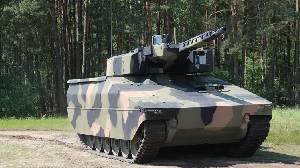Articles >>
Rheinmetall’s new IFV, the Lynx
Category: Future Technologies

At Eurosatory 2016 Rheinmetall presented its new Lynx infantry fighting vehicle today to the international public for the first time. Agile, hard-hitting and highly protected, this state-of-the-art tracked armoured vehicle is destined to dominate the modern battlefield, lending itself to operations from peace enforcement to high-intensity combat. Ben Hudson, Head of Rheinmetall’s Vehicle Systems Division, said "Lynx is an advanced new modular family of vehicles that offers our customers the highest levels of survivability, mobility, lethality and capacity while utilising proven technologies to deliver a compelling value proposition for our global customers. Lynx delivers the capabilities that will allow our customers to fight, survive and win on the battlefields of today and tomorrow". Cutting edge capabilities
Four core capabilities characterize the Lynx infantry fighting vehicle: firepower, force protection, situational awareness and mobility. Firepower: Lynx features a Rheinmetall LANCE turret armed with a stabilized, externally powered, airburst-capable automatic cannon (either 30mm or 35mm). This enables Lynx to effectively engage targets with high precision at ranges of up to 3,000 metres – even on the move. Lynx can also be equipped with an antitank guided missile launcher and a secondary weapon station linked to the main optics (main sensor slaved armament). Not only does Lynx have hunter-killer capability, it can operate in killer-killer mode, since the commander and gunner can observe and engage targets independently of each other. Force protection: With the diesel engine mounted in the forward section and a modular armour concept, the vehicle architecture offers a high degree of protection. The vehicle’s ballistic armour shields Lynx from antitank weapons, medium-calibre ammunition, artillery shrapnel, IEDs and bomblets. In addition, a spall liner in the vehicle interior protects the entire crew. Mine and IED protection packages, decoupled seats and the optional hard kill Active Defence System (ADS) significantly boost the vehicle’s survivability. Situational awareness: The commander and gunner both have access to the Stabilized Electro Optical Sight System/SEOSS, a digital TV - IR optical system with an integrated laser range finder and fire control computer. In the fighting compartment, displays provide the crew with a seamless 360° panoramic view. Rheinmetall’s Situational Awareness System (SAS), featuring automatic target detection and tracking, enhances the hunter-killer capability and minimizes crew reaction time. Emerging threats can be swiftly engaged with Lynx’s main or secondary armament. Laser warning sensors and the Acoustic Sniper Locating System (ASLS) likewise form part of the sensor suite. A combat management system and intercom for tactical communication round out the array of on-board equipment. Owing to the manned turret, the commander can still lead from the hatch. The gunner and driver each have hatches, too, while two soldiers in the rear of the fighting compartment can also observe the area around the vehicle from an open hatch. Mobility: Lynx features an excellent power-to-weight ratio and can handle gradients of up to 60 degrees and lateral inclines of more than 30 degrees. It can cross ditches up to 2.5 metres wide and ford bodies of water up to 1.50 metres deep. Furthermore, it can climb over one-metre-high obstacles. The vehicle can run on either rubber or light metal tracks. One vehicle family – one logistics system – one supplier: Rheinmetall
Another characteristic of Lynx is its versatility. For example, the new IFV comes in two versions: the KF31 and KF41 (KF stands for ‘Kettenfahrzeug’, or tracked vehicle in German). Weighing up to 38 tonnes, Lynx KF31 on display at Eurosatory and can seat 3+6 soldiers. Lynx KF41 is slightly larger and can carry 3+8 soldiers. Both vehicle classes – Lynx KF31 and Lynx KF41 – can be configured for other roles include a command & control, an armoured reconnaissance, repair & recovery and an ambulance. A high degree of commonality in parts and components is another prominent feature of the Lynx family of vehicles. This simplifies logistic support and has a positive impact on training. Furthermore, customized service support is available worldwide – ranging from training and logistics to in-theatre repairs and technology transfer. The Lynx family of vehicles highlights once again Rheinmetall’s role as a high-tech enterprise for security and mobility. |
Rheinmetall |
Rheinmetall to Feature Next Generation 130mm Tank Gun at AUSA Global
04.11.2019
Rheinmetall MAN Military Vehicles GmbH - RMMV
Rheinmetall Verseidag Ballistic Protection GmbH
Rheinmetall Soldier Electronics GmbH
Rheinmetall AG, Representative Office Abu Dhabi
Rheinmetall Waffe Munition GmbH
Rheinmetall Defence Electronics GmbH
Rheinmetall Waffe Munition Arges GmbH
American Rheinmetall Munitions, Inc. - ARM
Rheinmetall Denel Munition (Pty) Ltd - RDM
Lynx (Wheeled armoured personnel carrier)
Lynx (Multiple rocket launcher)
Lynx KF31 (Infantry fighting vehicle)
Lynx KF41 (Infantry fighting vehicle)
Discuss
